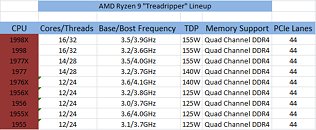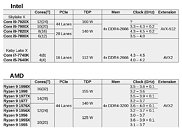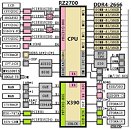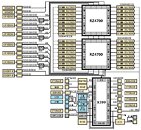Monday, May 15th 2017

AMD Ryzen 9 "Threadripper" Lineup Leaked
Today is an eventful day in the tech world, with two high-impact leaks already offering themselves up to our scrutiny. We had previously covered AMD's upcoming HEDT platform, based on the company's new X399 chipset, as having a quite distinctive lineup of processors, with not only 16 and 12-core offerings hot on foundries presses', but also some 14-core, 28-thread chips as well. Now, a leak has apparently revealed the entire Ryzen HEDT platform, whose processor marketing name, Ryzen 9, sounds really close to Intel's Core i9.
AMD's offerings look to offer an edge at least on core-count, with the Red team's top offerings, the Ryzen 9 1998X and Ryzen 9 1998, bringing in a game-changer 16 cores and 32 threads to the table. Perhaps even more importantly, we have to mention that the 1998X (these names, if true, are quite a mouthful, though) achieves a 3.5 GHz base, 3.9 GHz boost clock, which owes nothing to AMD's Ryzen 7 1800X consumer flagship CPUs. Rumors of AMD's frequency demise on higher core-count Ryzen CPUs have been greatly exaggerated, it would seem. And did I mention that these chips are coming with a TDP of 155 W - 5 W lower than Intel's purported 12-core, i9-7920X offering? Consider that for a moment.The 14-core parts are reported to be the Ryzen 9 1977X and Ryzen 9 1977. The Ryzen 9 1977X is a 155 W 14-core, 28-thread processor with a base clock speed of 3.5 GHz and a boost clock speed of 4.1 GHz with XFR. The Ryzen 9 1977 brings those speeds down a bit towards 3.2 GHz base and 3.7 GHz boost, with a correspondingly lower TDP of 140 W.
On to the 12-core parts, three different processors are expected: the Ryzen 9 1976X, Ryzen 9 1956X and the Ryzen 9 1956 (strange naming scheme with that 2-algharism difference between two parts with the same number of cores, I'd say.) The Ryzen 9 1976X is a 12-core, 24-thread, 140 W part, with a base clock 3.6 GHz and a boost clock speed of 4.1 GHz with XFR; the Ryzen 9 1956X lowers the TDP to just 125 W, on account of a lower base clock speed of 3.2 GHz and a boost clock speed of 3.8 GHz with XFR. The entry level 12 core part, the 1956, is rated at the same 125 W while running at a base clock speed of 3.0 GHz and a boost clock speed of 3.7 GHz.
There are also supposed to be two 10-core CPUs in this lineup, both rated at 125 W. The Ryzen 9 1955X, which runs at 3.6 GHZ base, and 4.0 GHz boost with XFR, and the Ryzen 9 1955, which runs at a base clock of 3.1 GHz and a 3.7 GHz boost.
I have to say, AMD is doing an amazing job with its Ryzen lineup, and the absolutely bonkers core-count on this X399, Whitehaven platform is most likely than not run circles around its Intel counterparts. Gone are the days of AMD's higher core count at the expense of computational power and IPC; as we've seen, AMD's Ryzen has achieved a great enough boost to its IPC that it can leverage its higher number, svelter cores over Intel's architecture, with absolutely mind-blowing TDP numbers (really, take another look at those TDPs in comparison to Intel's Core i9 series.)AMD's Whitehaven platform looks to be an attractive prospect. Let's just hope AMD's platform stability and compatibility quirks are fully ironed-out until the expected June release.
Source:
WCCFTech
AMD's offerings look to offer an edge at least on core-count, with the Red team's top offerings, the Ryzen 9 1998X and Ryzen 9 1998, bringing in a game-changer 16 cores and 32 threads to the table. Perhaps even more importantly, we have to mention that the 1998X (these names, if true, are quite a mouthful, though) achieves a 3.5 GHz base, 3.9 GHz boost clock, which owes nothing to AMD's Ryzen 7 1800X consumer flagship CPUs. Rumors of AMD's frequency demise on higher core-count Ryzen CPUs have been greatly exaggerated, it would seem. And did I mention that these chips are coming with a TDP of 155 W - 5 W lower than Intel's purported 12-core, i9-7920X offering? Consider that for a moment.The 14-core parts are reported to be the Ryzen 9 1977X and Ryzen 9 1977. The Ryzen 9 1977X is a 155 W 14-core, 28-thread processor with a base clock speed of 3.5 GHz and a boost clock speed of 4.1 GHz with XFR. The Ryzen 9 1977 brings those speeds down a bit towards 3.2 GHz base and 3.7 GHz boost, with a correspondingly lower TDP of 140 W.
On to the 12-core parts, three different processors are expected: the Ryzen 9 1976X, Ryzen 9 1956X and the Ryzen 9 1956 (strange naming scheme with that 2-algharism difference between two parts with the same number of cores, I'd say.) The Ryzen 9 1976X is a 12-core, 24-thread, 140 W part, with a base clock 3.6 GHz and a boost clock speed of 4.1 GHz with XFR; the Ryzen 9 1956X lowers the TDP to just 125 W, on account of a lower base clock speed of 3.2 GHz and a boost clock speed of 3.8 GHz with XFR. The entry level 12 core part, the 1956, is rated at the same 125 W while running at a base clock speed of 3.0 GHz and a boost clock speed of 3.7 GHz.
There are also supposed to be two 10-core CPUs in this lineup, both rated at 125 W. The Ryzen 9 1955X, which runs at 3.6 GHZ base, and 4.0 GHz boost with XFR, and the Ryzen 9 1955, which runs at a base clock of 3.1 GHz and a 3.7 GHz boost.
I have to say, AMD is doing an amazing job with its Ryzen lineup, and the absolutely bonkers core-count on this X399, Whitehaven platform is most likely than not run circles around its Intel counterparts. Gone are the days of AMD's higher core count at the expense of computational power and IPC; as we've seen, AMD's Ryzen has achieved a great enough boost to its IPC that it can leverage its higher number, svelter cores over Intel's architecture, with absolutely mind-blowing TDP numbers (really, take another look at those TDPs in comparison to Intel's Core i9 series.)AMD's Whitehaven platform looks to be an attractive prospect. Let's just hope AMD's platform stability and compatibility quirks are fully ironed-out until the expected June release.





83 Comments on AMD Ryzen 9 "Threadripper" Lineup Leaked
My R5E10 setup along with the Dom Plats @3000XMP idles around 35-40c.
Don't you have the 5960x? maybe that's partly to blame.
What speed is your proc at? I'm at 4.6
Haswell-e is dated now so I'm with you on the need for change. Some good times are definitely coming, make sure to tag me in your log.
As always sweet rig.
I do need a test bench rig...Any case ideas?
Not sure if I take a performance hit or not going with 3x120mm vs 1x360mm, but a single 360mm rad offers ports ONLY on a single end of the build, in and out, so the tube runs "somewhere" have to be very long from rad to component.
3x120mm rads offer shorter tubing runs from pump > rad, and rad > monoblock and monoblock > rad (those two 120mm rads near the CPU are to feed the CPU monoblock).
The downside? 3x120 rads cost more than 1x360, plus the added number of fittings needed increases. But the overall aesthetic and port options is vastly improved.
And these Hardware Labs Multiports offer 8ports/rad, so build options are almost endless. :clap:
Sorry for moving offtopic Lord Ravenholm. Just answering a question, Please Forgive. :toast:
Just built it last week, it's beginning to look like Batman's computer. :roll:
Oh boy, did I hurt the fanboy's feelings? Hopefully you can get this X399 chipset, that 8350 probably could use an update...
Whilst this news of a 16 core makes me really happy and I can't wait to see what AMD can do with these beasty chips, I don't think this is the right generation for me to jump & upgrade to -- as I don't think they are going to fix any of the cache overspill, low core clocks and memory issues. From my past experience with AMD, all my money is on the next lot of chips (i.e. Zen+/Pinnacle Ridge) -- as their best chips are always the second gen. Case(s) in point:
Phenom I (Agena) to Phenom II (Deneb and Thuban) -- from barely sub-3GHz OCs to 4.1GHz+, from low-clock DDR2 support to good DDR3 support and much better single and dual threaded performance
Bulldozer/FX 8150 to Piledriver/FX 8350 -- from sub-3.8ish GHZ OCs to 4-4.5GHz+ at lower TDP, much better memory support and improved
multi-threading
These Ryzen chips are their first major architecture upgrade that's hit a home-run in the first generation, so I am seriously tempted to upgrade my ancient 2500K rig, but I want to make sure threaded performance (for apps and games that use 4 cores or less) is not going to handicap it in any way and is at least a minor 25%-ish upgrade from my current rig, and not a trade-off for more cores at lower clocks. We all know it is a matter of time until 8 cores become the standard, but anything beyond is going to take much longer to go mainstream and since Intel has announced 6 core mainstream CPUs, they will be going at it in the Gigahertz race, just like back in the Pentium 4 days (with less cores, but higher clocks). Not that I don't need the extra cores though -- god knows I need as many cores as I can get with 3D rendering/games development and audio editing software that I currently use anyway.
I've just got a feeling Zen+ should work out all the issues/kinks of this platform without any trade-offs -- but hopefully I can still wait until then and they don't plan on delaying its release from Q1/Q2 2018 at latest...fingers crossed...
P.S. also a bit off-topic, but if Vega can improve 1080p performance massively from Fury X, I will build an all-AMD rig for the first time since the Phenom II/Deneb days...can't wait (I'm one of the few people that prefers lower res at higher frame rates than vice versa).
I also don't jump in intel threads to spread FUD like you do in AMD threads, so tell me who the fanboy is?
Check the cpu-z spec kiddo. Infact check my Signature. WCG/Folding Loves these units, plus games well.
I already have an upgrade set anyway as the wife needs one from a P4. The only true upgrade was 2011-3 or AM4 or Naples as skt 1366/1156/55/50/51 would just at best be a sidegrade, thus wasteful spending.
Intel's development takes a bit longer, but then we shouldn't be surprised - they have to meet somehow higher expectations (more commercial clients, less gamers).
HEDT goes way past the sole needs of gamers.